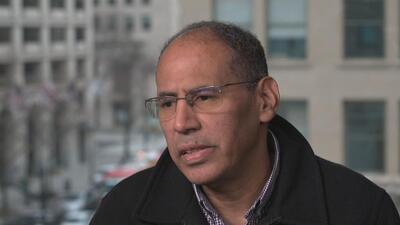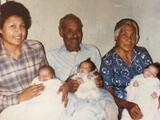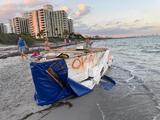How 222 Nicaraguan former political prisoners were exiled and stripped of their nationality, but still not considered refugees

After only a little over a week of freedom, Jose Antonio Peraza, a 56-year-old Nicaraguan politologo is still finding his feet, trying to start a new life in the United States.
He is currently staying in the basement of the home of a friend of a friend in Virginia, on the outskirts of Washington DC.
"I've been to Washington three times in my life and it's been in and out each time," he said in a phone interview. "I don't have close family here, and so I'm relying on friends. Right now, I have a place to live. At least for now and next week," he added.
Pereza is one of 222 former political prisoners who were kicked out of their country and striped of their citizenship last week by the Nicaraguan government of Daniel Ortega.
Now they are now caught in an unusual legal limbo, having been granted humanitarian parole in the United States, which affords only limited benefits, and does not recognize them as a stateless refugees.
“It’s an unfortunate situation. They lost their nationality, but they are not considered refugees,” said Jennie Lincoln, advisor for Latin America at the Carter Center in Atlanta, Georgia, founded by former U.S. president Jimmy Carter. “The U.S. government’s hands are tied. They are limited what they could offer for resettlement because of the way they entered,” added Lincoln, who is a veteran of U.S. relations with Nicaragua.
"Blindsided"
The dilemma stems from the almost unprecedented manner in which they left the country. It was only after they were airborne on a U.S. government-chartered plane, that Nicaragua’s National Assembly announced summary passage of a law stripping them of their citizenship. Their homes and property in Nicaragua was also ordered confiscated by the government this week.
“Neither the exiles, nor the U.S, government, had any clue that Ortega would lift their citizenship. They were blindsided,” explained Lincoln, who participated in State department briefings this week and met several of the released prisoners in Washington. “They were deceived, and it was probably part of (Ortega’s) plan,” she added.
Under U.S. law, humanitarian parole allows the beneficiary to remain in the United States for two years and apply for a work permit and possible residency through a relative or an employer. They can also apply for the lengthy process of asylum. But that’s all.
As refugees, the former Nicaraguan political prisoners would have been entitled to other benefits such as a monthly cash assistance, food stamps and health insurance, as well as resettlement assistance from private charities, such as churches, that work with the government. Also, after one year and one day as refugees in the United States, they have the right to apply for legal permanent residency.
Government depends on NGOs for assistance
Instead, the State Department invited several private groups and the Nicaraguan diaspora to help out, including human rights organizations and church groups with experience in resettlement of asylum seekers and refugees.
“We’re engaging with resettlement NGOs who are very skilled and experienced in precisely these types of operations … to see to it that these individuals have a roof over their heads,” Ned Price, the State Department spokesman told a media briefing.
The former prisoners are a varied group of prominent opposition political figures, including presidential candidates, academics and student leaders, as well as largely unknown activists. Some of the exiles have their own resources and close family – including wives and children - in the United States, such as Juan Sebastian Chamorro, and Felix Maradiaga.
“Juan Sebastian and Felix will be fine. It will be very easy for them, all things considered,” said Jared Genser, a Washington-based human rights lawyer who lobbied tirelessly on their behalf and put them up in his home after they arrived in Washington.
Chamorro has a PhD from the University of Wisconsin and speaks fluent English, besides being a member of Nicaragua’s most famous family, owners of La Prensa, the country’s oldest newspaper. His wife and daughter were also already living in the United States. Maradiaga also has a wife and daughter in Miami.
Many Nicaraguan ex-prisoners don't have family in the US
“But two-thirds have no family whatsoever in the US and don’t speak a word of English,” said Genser.
Among the 222 prisoners are 72 fathers and mothers of some 150 minor children, according to political prisoner advocates. “Family reunification will be a top priority,” he said, noting that parolees can’t bring their family o the United States. He said he was already in discussion to seek a bill in Congress to sped up that process by granting them refugee status.
“They came with no bag, nothing, just their clothes,” said Leonce Byimana, the Director of US Clinical Programs for the Center for Victims of Torture (CVT). “They had to rely on donated jackets when they arrived,” he added, noting it was in the 40s fahrenheit when they landed in Washington.
The US government provided them with three days in a hotel where they were given $300 and a cellphone, as well as help finding a place to stay. Those with family sponsors or friends quickly left while others were placed with private organizations with programs around the country.
A State Department map showed exiles heading to 24 states, with 67 in Florida, more than 50 in the Washington DC area, as well as 10 in Texas.
“I was really impressed by the government’s coordination in finding volunteers,” said Byimana, a 40-year-old clinical psychologist who is himself a refugee from Ruanda in 2015.
CVT conducted an emotional and mental health assessment for 108 of the exiles. Of those 62 chose to attend sessions where they could share their experiences with therapists. A handful who showed signs of severe mental health challenges were given extra days of therapy. “The majority have been tortured physically and mentally. We are going to take care of their mental wellbeing,” said Byimana. “We are going to follow them remotely wherever they are and match them with local organizations,” he added.
Other groups are helping with legal issues, such as applying for a work permit, which can take six months, as well as future, long term options, such as political asylum, or others paths to residency, such as profession-based applications or family reunification for those with relatives here already.
No work permit or health insurance
“For six months they will have no employment,” said Byimana. “And they have to pay for their own health insurance,” he added. CVT works with local groups to help reduce or eliminate some of those costs for medications and healthcare.
While under the parole they also can't travel outside the country to visit family or get work.
The US Citizenship and Immigration Services (USCIS) has agreed to waive the $410 application fee for a work permits for the Nicaraguan exiles, as well as expediting applications, said Anwen Hughes, the Director of Legal Strategy with Human Rights First, one of the groups collaborating with the State Department to provide assistance to the former prisoners.
HRF also planned to used its network to help find pro bono legal representation for those exiles who need assistance, most of whom will likely have to file lengthy and experience asylum cases.
Bitter-sweet solution
She compared to the larger effort to resettle assist Afghan refugees in 2021. While the humanitarian parole was not the ideal solution, Hughes said it was the fastest option to bring the Nicaraguans into the country, partly due to limited federal funding for refugee programs and a backlog of cases. “But the challenge is that this then puts the onus on these people to try to sort out a more lasting situation solution for themselves, which for many of them is going to take the form of applying for asylum in the United States,” she said.
For everyone involved, the fate of the exiles leaves a bitter-sweet taste. “When you've got a bunch of people who are in jail for unjust reasons the goal is to get them out of jail and let them return to their lives,” said Hughes, who also credited the State Department for doing the best it could with limited time and resources. “What's just happened to these people is very much a second, a second best to that. And so, it's a solution of sorts. I mean it's not what anyone wants,” she added.
For Peraza, like many others, he said he was grateful to be free. "There is a big difference between being in prison and being free. The United States is a prosperous country, but I lack everything," he said.
Friends sent him some money to buy clothes, "With that I bought three pairs of pants, three shirts, six underpants. And fortunately I have friends who are sending me money without asking for it. But that doesn't last forever," he said.
Peraza hopes to stay in the Washington area if he can. “I can get more work here because this is where the political world is,” he said, referring to federally-funded pro-democracy organizations he has worked with in the past.
An American friend had also offered him a place to stay in Florida, while another friend in Georgia offered to send him a laptop computer. For the moment he said he was simply enjoying being able to communicate daily with his 19-year-old son in Canada and 14-year-old daughter in Managua.
Compared to others he felt well off. "I put myself in the shoes of a Mexican or a Nicaraguan who crosses the river at the Mexican border and has nothing. At least I have some education, I can communicate in English and I have some friends," he said.
"But for a lot of people it's going to be a very difficult adaptation process. Some of them have never left their country. Yes, it's complex for me because I've been to the U.S. many times and I know the culture. I imagine that for many people it will be a very difficult adaptation process," he added.




